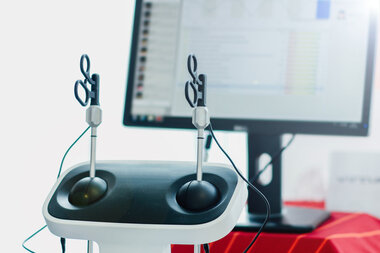5 October 2022
A recent study supported by KHP Academic Surgery shows high-fidelity simulators provide improvements to vascular surgery education and real-world performance.
Influenced by the aviation and military sectors, simulation has become more apparent in medical education and has grown to be incorporated in the training curricula of various specialties, including vascular surgery. This process has been sped up by advancements in surgical technology, reduced working hours, and training opportunities exacerbated by the COVID-19 pandemic.
Furthermore, a rise in endovascular procedures (less invasive procedures used to treat problems affecting the blood vessels) has led to a requirement for high-fidelity simulators that offer comprehensive feedback to the user. High fidelity simulation is able to provide participants with a learning environment in which to develop non-technical skills, that is safe and controlled so that the participants are able to make mistakes, correct those mistakes in real time and learn from them, without fear of compromising patient safety.
A recent review supported by KHP Academic Surgery, aimed to identify vascular surgery simulation models and assess their validity and effectiveness, in order to successfully implement them into current training curricula for vascular surgeon trainees.
First author Alexander Haiser, GKT School of Medical Education, King’s College London, explained more about the findings:
Surgical simulation technology has developed rapidly over the last century, progressing to high-fidelity computer or virtual reality simulators with touch feedback. Within the literature, there has been considerable research and validation of surgical simulators within various surgical subspecialties, including vascular surgery. However, there was a lack of studies reviewing open and endovascular surgical simulators using modern validity techniques.
Our study found that high-fidelity simulators such as ANGIO Mentor were the most highly validated and offered the most transferable skills to surgical trainees by demonstrating an improvement in real-world performance, knowledge, patient outcomes, and skill retention. Additionally, in order to effectively integrate simulation models into the vascular surgical curriculum, more studies need to utilise the modern concept of validity and there needs to be a longer follow-up time of trainee skill retention, and a discussion of cost-effectiveness. Overall, it was excellent news to hear that our study got published in the Journal of Surgical Research and I would like to thank my colleagues for all their help and hard work to reach this stage.
As evidenced in this study, simulation-based training is a continuously developing field with exciting future prospects for surgical education and improved patient care. You can read the full findings in the Journal of Surgical Research.
Liked this article? You can read more about KHP Academic Surgery’s latest research and trials here.





